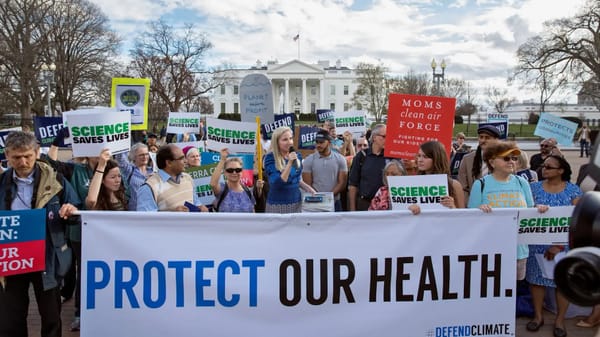Millions of Full-Time Workers Still Lack Health Insurance Despite Record ACA Enrollment Under Biden Administration
Despite record enrollment in Affordable Care Act (ACA) coverage, millions of full-time workers remain uninsured. A recent report highlights persistent disparities among low-income earners, workers of color, and non-citizens, underscoring systemic gaps in the nation's health care system

By Chuck Beaton | DayMark News
WASHINGTON, D.C. — The Affordable Care Act (ACA), often referred to as “Obamacare,” has reached historic enrollment levels under the Biden-Harris Administration, with nearly 24 million Americans signing up for Marketplace coverage during the 2025 open enrollment period. This represents a near doubling of ACA enrollment since President Joe Biden took office, a milestone in the administration’s effort to make affordable health care accessible to all. Yet, despite these gains, a significant number of full-time workers remain uninsured, highlighting persistent gaps in the nation’s health care system.
President Biden lauded the enrollment achievement as a testament to his administration’s commitment to health care reform. “Enrollment has nearly doubled since I took office,” Biden said in a statement. “We’ve worked to bring down the cost of health care, make coverage easier to access, and strengthen programs like the ACA, Medicare, and Medicaid.” Despite these strides, challenges persist, as millions of workers remain without coverage due to systemic inequities and gaps in the law.
A recent report from the Center for Economic and Policy Research (CEPR) sheds light on these disparities. In 2023, nearly 16 million workers lacked health insurance for the entire year, with 10.2 million employed full-time. Many of these individuals are caught in a gray area—earning too much to qualify for Medicaid but unable to afford employer-sponsored or Marketplace insurance. This issue disproportionately affects workers of color, low-income earners, and non-citizens. Hispanic workers were uninsured at a rate of 21.1%, compared to 9.1% for Black workers, 5.5% for White workers, and 5.1% for Asian workers. Similarly, non-citizen workers born outside the United States faced an uninsured rate of 28.9%, more than four times higher than U.S.-born citizens.
Education and income also play pivotal roles in health care access. Workers without a high school diploma were the most vulnerable, with 32.3% uninsured, while just 4% of college graduates lacked coverage. Among the lowest wage earners, more than 20% were uninsured, compared to less than 2% of the highest earners. These figures reveal that gaps in the ACA’s design, particularly its reliance on employer-sponsored coverage, continue to leave millions without access to affordable care.
The Biden-Harris Administration attributes its record-breaking enrollment numbers to targeted initiatives that have reduced costs and simplified the enrollment process. By expanding premium tax credits, the administration has saved Marketplace enrollees an average of $800 annually on their premiums. Outreach efforts have focused on rural and underserved communities, while bureaucratic barriers that once complicated sign-ups have been eliminated. Medicaid expansion has also played a crucial role, with over one million Americans in four additional states gaining coverage during Biden’s tenure. Today, Medicaid covers approximately 80 million people, driving ACA-related enrollment to over 45 million.
However, these advancements are now under threat. Congressional Republicans have proposed eliminating the enhanced premium tax credits that have made ACA coverage more affordable. This move could result in skyrocketing premiums and an estimated three to five million Americans losing insurance. For example, a single parent earning $50,000 annually could see premiums increase by $1,600 per year, while a retired couple earning $85,000 might face a staggering $18,000 hike. The potential rollback has raised alarms among advocates and policymakers alike, who warn of catastrophic consequences for families across the nation.
Despite the ACA’s successes, millions of Americans continue to struggle with access to affordable care. For uninsured workers, basic preventive services and life-saving treatments remain out of reach, often leading to severe health and financial consequences. CEPR researcher Emma Curchin emphasized the urgency of addressing these gaps, noting, “These gaps leave millions of people—many of them working full-time all year—unable to secure insurance coverage. Policymakers must focus on solutions for delivering consistent coverage to everyone.”
The Biden administration has also taken steps to tackle broader health challenges. Initiatives such as the Medicare Drug Price Negotiation program have reduced costs for seniors, while insulin prices are now capped at $35 per month. Efforts to combat the maternal health crisis have led to postpartum Medicaid coverage being extended from two to 12 months in 46 states and the District of Columbia. The 988 lifeline, established to address mental health crises, has answered over 11 million calls, chats, and texts since its launch. Additionally, overdose deaths have declined by 17% in the 12 months ending July 2024, marking the largest reduction in U.S. history.
While the Biden administration celebrates these achievements, the persistence of uninsured full-time workers underscores the ongoing need for comprehensive health care reform. The ACA’s reliance on employer-sponsored insurance and eligibility thresholds for Medicaid continue to leave vulnerable populations behind. As health care remains a divisive political issue, advocates hope these findings will push policymakers to prioritize equitable access to coverage.
For more information, read CEPR’s Chronic Condition: Working Without Health Insurance and the Biden-Harris Administration’s report on health care progress. Both highlight the significant strides made and the challenges that remain in ensuring every American has access to affordable, quality health care.
At DayMark News, we are committed to exposing the rise of authoritarianism and its threat to democracy. In a time when disinformation spreads like wildfire and democratic institutions face relentless attacks, we need your support to keep the fight alive.
Investigative journalism is our weapon against authoritarian ideologies. We delve deep to uncover the truths others would rather keep hidden, while providing actionable resources to empower individuals like you to defend our democracy.
We believe in transparency, integrity, and the power of a well-informed public. But maintaining a platform dedicated to fearless reporting and mobilization requires resources. We refuse to bow to corporate interests or compromise our mission. That's why we turn to you — our community.
Every donation, big or small, helps us continue our work. With your support, we can produce the in-depth analyses, breaking news, and educational tools needed to resist the rise of extremist movements and protect democratic values for future generations.
This fight belongs to all of us. Together, we can ensure that democracy not only survives but thrives. Please consider making a contribution today to keep DayMark News strong and independent.
Donate Now: Because Democracy Can't Defend Itself.

 Donate
Donate



